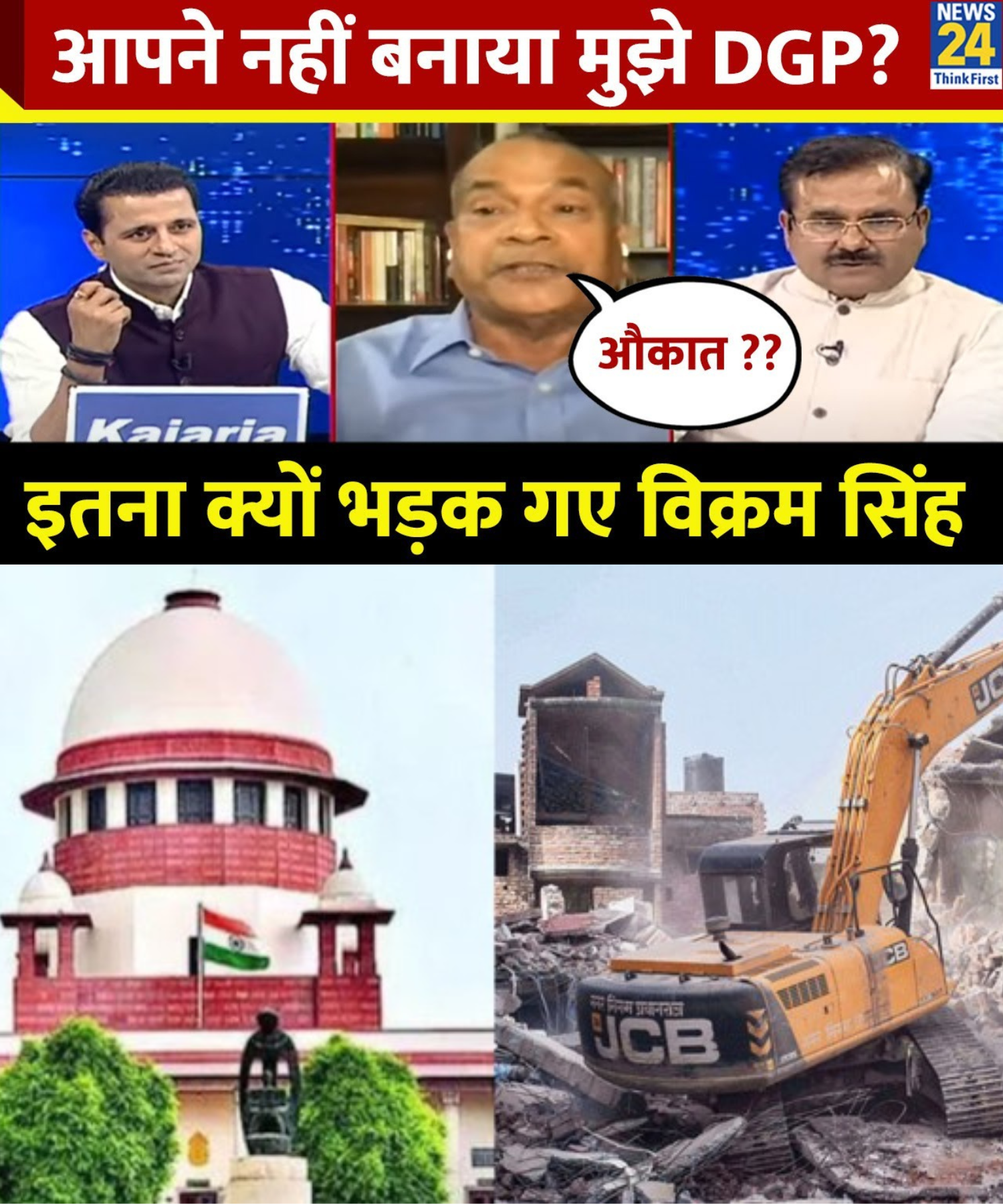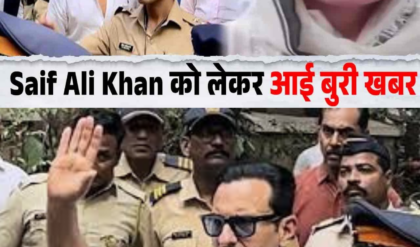What Did Former DGP Vikram Say About the Maharashtra Government’s Bulldozer Action and Violation of Supreme Court Guidelines?
Mumbai, India – In a political and legal storm that has taken center stage in Maharashtra, the state government’s recent bulldozer-led demolition drive—reportedly targeting “illegal constructions” in communal violence-hit areas—has come under sharp criticism from civil society, legal experts, and now, former Director General of Police (DGP) Vikram Singh, one of India’s most respected voices on law and order.
While the government claims the action was aimed at maintaining urban planning norms and removing encroachments, critics argue that the drive was arbitrary, targeted, and possibly in violation of Supreme Court guidelines, particularly concerning due process and the fundamental rights of citizens.
Now, with former DGP Vikram Singh speaking out, the controversy has only deepened—raising serious questions about law enforcement ethics, constitutional values, and political misuse of policing tools.
The Background: What Triggered the Bulldozer Action?
Over the past several weeks, multiple districts in Maharashtra—including Aurangabad, Kolhapur, and Jalgaon—witnessed communal tensions following incidents of violence during religious processions and protests. In the aftermath, local municipal bodies, under instructions allegedly supported by the state government, began demolishing structures said to be illegally constructed.
Videos surfaced on social media showing bulldozers tearing down roadside stalls, shanties, and even portions of residential buildings in minority-dominated areas. The visuals immediately drew parallels to similar controversial demolitions seen in Delhi, Madhya Pradesh, and Uttar Pradesh, sparking outrage among human rights activists.
Supreme Court Guidelines: The Legal Red Line
The Supreme Court of India, in a series of past judgments—including the landmark Olga Tellis vs. Bombay Municipal Corporation (1985) and more recent cases—has laid down clear procedural safeguards:
Any demolition must follow proper notice and hearing.
Individuals must be given a chance to present their side.
Demolition without due process is a violation of Article 14 (Right to Equality) and Article 21 (Right to Life and Livelihood).
Furthermore, the apex court has strongly discouraged punitive demolitions—tearing down property as a form of extrajudicial punishment for alleged criminal activity.

Enter Former DGP Vikram Singh: A Veteran Speaks
In an interview with India Law Journal, Vikram Singh, former DGP of Uttar Pradesh and a vocal proponent of ethical policing, did not mince words. While acknowledging the state’s responsibility to maintain law and order, Singh stressed that bulldozer justice is not real justice.
“The moment law enforcement becomes a tool of instant retribution, we are entering dangerous territory,” Singh said. “The Constitution provides us with laws, procedures, and courts. Bypassing those is not only illegal—it’s undemocratic.”
He continued:
“Bulldozing someone’s home or livelihood without giving them a chance to respond is not law enforcement. It’s mob justice with state machinery.”
Singh was especially critical of the selective nature of the demolitions.
“You cannot have one standard for one community and another for others. That is not justice—that’s vendetta. And vendetta is not a pillar of democracy.”
Singh Warns Against ‘Performative Policing’
One of the key themes in Singh’s critique was what he called “performative policing”—where law enforcement is used not to ensure public safety but to show muscle or send political messages.
“There’s a dangerous new trend where the law is weaponized for theatrics,” Singh warned. “Bulldozers rolling through narrow lanes may make for great TV footage, but they erode public trust in the system. When people stop believing in the rule of law, what’s left?”
He also reminded the public that police officers swear allegiance to the Constitution—not to political figures.
The State Government’s Justification
In response to the growing criticism, spokespersons for the Maharashtra government have claimed that the demolitions were purely administrative, targeting unauthorized constructions, and were not linked to any community or political motivation.
Urban Development Minister Eknath Shinde, in a press briefing, stated:
“Our drive is against illegal structures—irrespective of religion or background. This is about reclaiming public space and enforcing the law.”
However, the timing and selective targeting of the demolitions—particularly in areas recently affected by communal disturbances—has raised doubts about the neutrality of the action.
Legal Experts Echo Vikram Singh’s Concerns
Prominent legal voices have echoed Singh’s criticism. Senior Advocate Indira Jaising tweeted:
“Demolitions without notice are illegal. Using bulldozers as punishment bypasses courts, and that is unacceptable in any civilized society.”
Prashant Bhushan, another leading public interest lawyer, added:
“We are seeing the normalization of ‘bulldozer justice.’ It is a mockery of due process and undermines our entire judicial system.”
Several petitions have been filed in the Bombay High Court seeking a stay on the demolitions and demanding accountability from the municipal corporations involved.
Voices from the Ground: The Human Cost
For people directly affected by the demolitions, the damage is not political—it’s personal. Families who lost their homes overnight now struggle to find shelter.
Asma Begum, a widow whose roadside tea stall in Jalgaon was demolished, sobbed as she told reporters:
“I have been selling tea here for 15 years. I don’t know any law. They gave me no notice. Just came and crushed everything. Where will I go now?”
Rafiq Shaikh, a 45-year-old auto-rickshaw driver, said:
“They say it’s illegal. But if it was illegal, why did they let us build it? Why did they take taxes and electricity bills all these years?”
These testimonies reinforce the concerns raised by Vikram Singh and legal experts: when the law is used to punish without warning, it ceases to be justice.
Political Fallout and National Ramifications
The issue has now snowballed into a national political flashpoint. The Opposition parties, including the Congress, NCP, and Shiv Sena (Uddhav faction), have accused the ruling government of using state machinery for “communal polarization”.
Congress leader Rahul Gandhi issued a statement saying:
“India is not a bulldozer democracy. The Constitution must not be trampled by wheels of hate.”
Meanwhile, ruling party leaders have accused the opposition of “playing the minority card” and “obstructing urban development.”
What Happens Next? Legal Challenges and Public Pressure
The pressure is mounting on the Maharashtra government to halt the demolitions, conduct an independent inquiry, and provide rehabilitation and compensation to those affected.
Human rights groups have written letters to the National Human Rights Commission (NHRC) and the Supreme Court, urging immediate intervention.
In a related move, the Supreme Court of India is expected to hear a Public Interest Litigation (PIL) next week that challenges the legality of such bulldozer actions being carried out across multiple Indian states.
Conclusion: A Warning Bell for Indian Democracy
Former DGP Vikram Singh’s powerful words have brought a necessary, sobering perspective to the bulldozer controversy. His message is not just about one incident or one state—it is about the soul of Indian democracy.
“We built our Republic on the promise of law, fairness, and equality,” he said. “If we trade that in for the illusion of strength and speed, we will lose something far more valuable than a few illegal buildings—we’ll lose our trust in the system.”
As India watches how this controversy unfolds, one thing is certain: democracy is not measured by how loudly the bulldozers roar—but by how quietly and fairly justice is served.
News
Vivansh World Record: 4-Month-Old Baby Makes History, Everyone Shocked! Breaking News
Vivansh World Record: 4-Month-Old Baby Makes History, Everyone Shocked! In a world where records are set by seasoned athletes, technological prodigies, and lifelong achievers, a tiny miracle has stunned the globe. At just four months old, baby Vivansh Rajendra…
Ram Kapoor’s Wife Gautami Lashed Out Ekta Kapoor For Dig At Her Husband’s Weight Loss
Gautami Kapoor Shuts Down Ekta Kapoor’s Remarks on Ram Kapoor’s Weight Loss: A Bold Statement on Health, Respect, and Love In the glitzy world of Indian television, where image often overshadows essence, one power couple just reminded the world…
Terrible News: Popular TV Actor Aasif Sheikh Involved in an Accident
Terrible News: Popular TV Actor Aasif Sheikh Involved in an Accident In a recent and alarming incident, renowned television actor Aasif Sheikh, best known for his role as Vibhuti Narayan Mishra in the popular sitcom Bhabiji Ghar Par Hain,…
Mohammad Faiz and Neha Kakkar – Superstar Singer Season 2
Mohammad Faiz and Neha Kakkar – A Magical Journey on Superstar Singer Season 2 In the realm of reality television, few shows manage to capture hearts across generations the way Superstar Singer has. With a focus on young singing…
Top 6 Nutrients to Stop Leg Weakness in Seniors – Fast!
Top 6 Nutrients to Stop Leg Weakness in Seniors – Fast! As we age, maintaining strength and mobility becomes increasingly essential to living independently and enjoying a high quality of life. One common complaint among seniors is leg weakness,…
Top 10 Foods to Prevent Leg Cramps in Seniors — Even at Night!
Top 10 Foods to Prevent Leg Cramps in Seniors — Even at Night! Leg cramps are painful, involuntary muscle contractions that can strike without warning—often at night, disrupting sleep and affecting quality of life. Seniors are especially vulnerable…
End of content
No more pages to load











